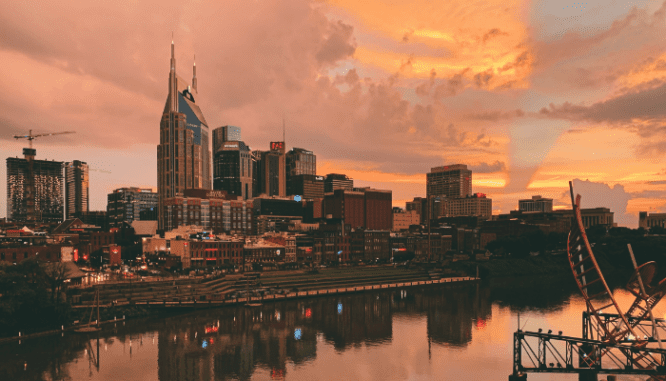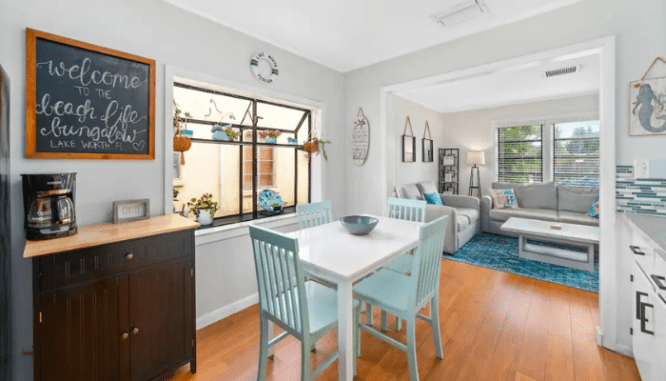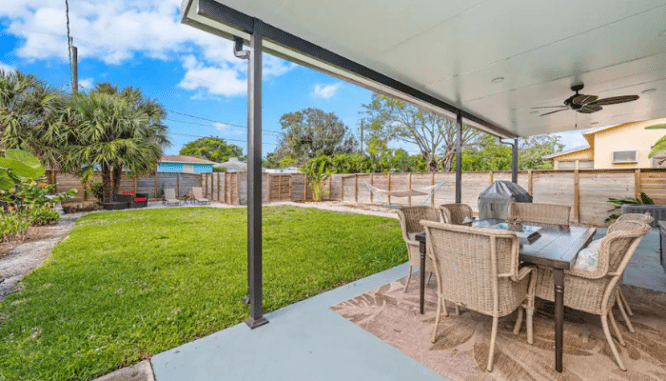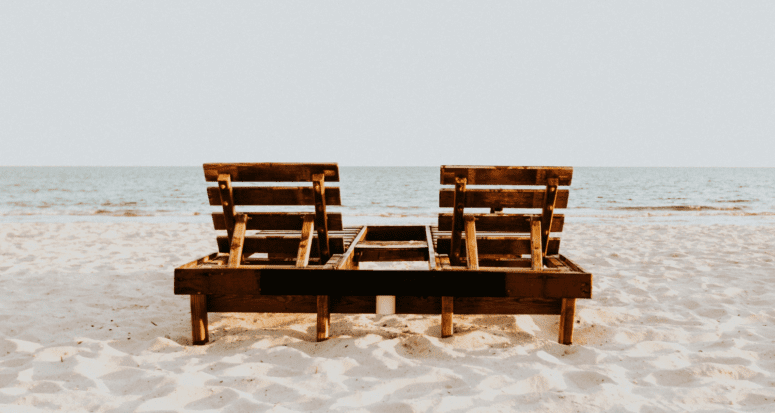Getting Into Real Estate Through Vacation Rentals: 3 Real People Tell Us How They Did It
- Published on
- 15 min read
-
 Amna Shamim, Contributing AuthorClose
Amna Shamim, Contributing AuthorClose Amna Shamim Contributing Author
Amna Shamim Contributing AuthorAmna Shamim is a writer and digital marketing consultant who works with local and e-commerce businesses, ensuring they are easily findable online to and trusted by their clients. Her words have been featured in Glamour Magazine, Business Insider, Entrepreneur, Huff Post, Thrive Global, BUST, Paste, and other publications.
-
 Amber Taufen, Former Managing Editor, Buyer Resource CenterClose
Amber Taufen, Former Managing Editor, Buyer Resource CenterClose Amber Taufen Former Managing Editor, Buyer Resource Center
Amber Taufen Former Managing Editor, Buyer Resource CenterAmber was one of HomeLight’s Buyer Center editors and has been a real estate content expert since 2014. The former editor-in-chief at Inman, she was named a “Trendsetter” in the 2017 Swanepoel Power 200 list, which acknowledges “innovators, dealmakers, and movers-and-shakers who made a noteworthy impact over the last year” in real estate, and her assessment of revenue and expenses at the National Association of Realtors won a NAREE Gold Award for “Best Economic Analysis” in 2017.
Investing in property is a long-held and sound piece of financial advice. Over time, property appreciates faster than inflation and can be a nice nest egg for retirement. But nowadays, it can be out of budget to afford your dream home — or it might make sense in your situation to keep renting your abode for now. Maybe you already own your dream home and want to keep growing your real estate assets, but long-term rentals aren’t a great fit for your situation. So what should you do then?
Consider investing in a short-term rental property!
Platforms like Airbnb and VRBO make it a lot easier for homeowners to make money on short-term rentals, while also giving them the flexibility to enjoy the property themselves — perhaps in the off-season or for select weekends.
If property ownership sounds like a smart investment to you (and it generally is!) but you don’t want to learn about or deal with a real estate investment trust (REIT), then buying a property that you use as a short-term rental could be a great option for you.
We interviewed three homeowners who have chosen this route, as well as a top real estate agent who works with buyers looking at short-term rental properties, in order to help you figure out if this is a good option for you and what potential pitfalls to look out for.

1. Cara Berkley, founder of Penny Polly
Penny Polly is a financial blog where Cara talks about her Airbnb experiences and shares personal finance tips.
How did you first learn vacation rental investing was possible?
I heard about a friend here in Nashville who was renting out her own home on Airbnb and making a lot of money. When I heard the amount she had made over just a couple of months, I realized it was a great opportunity.
What made you decide to take the plunge and do it?
I was looking for a first home to purchase for myself at the time, but quickly realized it would make a lot more sense to purchase a rental home that I could put on Airbnb. I could use the investment of a home to make more money, instead of just purchasing a home to live in. I didn’t want to lose the chance to take advantage of Nashville’s booming tourism business.
Where did you decide to buy?
Nashville because I live here and the Airbnb business was doing really well here. I reached out to a couple of property owners and did some research on my own to make sure before I took the plunge.
It was obvious that I could make money, and Nashville had the advantage of being local to me. I also didn’t have to worry about the large monthly HOA fees that a beach vacation home would include.
How did you go about saving up money for the down payment?
I had been saving for a while to purchase my own home. I worked an extra job and was frugal. I also sold some company stock I had to help with the down payment.
How much did you need to save?
To purchase a rental property, you will need 20% down, so it all depends on the price of the home you are buying.
Do you have property managers or cleaners, or do you handle the maintenance and upkeep yourself?
I have a full-time job, so I rely on a cleaning crew. However, I do not use a property manager, as they take a pretty large cut and I could easily handle everything outside of the cleaning, like messaging guests, paying taxes, and keeping a schedule.
I made that decision because I quickly realized the property management work was not that involved, and certainly not worth giving up a lot of profit. I also had a maintenance guy to help me with repairs that were needed.
Is this a profitable investment for you yet?
Extremely profitable! I didn’t make as much the first year as I could have because I wasn’t charging enough, but once I got the hang of it, I was making a lot of money.
How much have you made?
First of all, I was able to pay the mortgage every month with booking fees, allowing me to essentially purchase the home for nothing but the down payment. On top of that, my profit each year after all expenses was usually around $35,000 but sometimes more.
What are you doing with any profit?
I used the profit as a down payment to buy a second home!
The second home was my personal home that I lived in. It had a main suite on one side of the house with a private entrance that I rented. I put up a temporary plywood wall between the suite and my side of the house, ensuring the two sections were completely separate, so I could rent it out on Airbnb!
Renting it out paid my entire mortgage pretty much every month. It’s crazy, but if you are strategic in what house you purchase, you can make it so the down payment is the only money you ever pay out of pocket for the house.
What advice would you have for someone who wants to try this?
Start today! Don’t buy a home just for yourself, use your first home purchase as a business investment designed to help you make more money. Vacation rental homes are an ideal side-hustle and business to make a passive income.
What were the biggest mistakes you made?
Not charging enough for bookings in the first season! I shortchanged myself, unfortunately.
Rick Fuller, an Elk Grove, California agent who works with 74% more single-family homes than the average agent in his area, often collaborates with clients who are looking to purchase a second home to use as a short-term rental. As part of the purchase process, they look at factors such as local regulations, popularity of the destination, and even taxes, to determine whether a property would be a good short-term rental or if it would work better with a tenant on an annual lease.
He explains that “Different properties in different communities have their highest and best uses, and that varies. Sometimes, they’re long-term rentals — and sometimes the highest and best use may be a short-term rental.” Paying attention to these details during the shopping process can save quite a lot of headache later on.

2. Leonard Ang, CEO, iPropertyManagement
iPropertyManagement is a resource full of help guides for landlords, listings of local property management companies, and an abundance of templates and contracts.
How did you first learn vacation rental investing was possible?
I suppose I always knew that vacation homes could be rented out, but I assumed that they were mostly owned by families who made use of them for much of the year and rented them out a bit on the side.
It wasn’t until my wife and I stayed at a vacation rental and I got to chatting with the owner that I understood that vacation rentals could be good real estate investments. That conversation started me on the road to adding vacation rentals to my portfolio.
What made you decide to take the plunge and do it?
The final factor that led to me buying my first vacation rental was finding a vacation home I really loved. I knew I would want to spend some time at this place myself in addition to renting it out.
It was the view of the mountains out the picture window in the living room that finally sold me on one specific home. I knew it was a good investment, and I knew I wanted to vacation here myself.
Where did you decide to buy? Is it a place close to you, in a different state?
I actually chose a place in the same ski resort town we had been staying in, on advice from the owner of the vacation home we rented. It’s several hours’ drive from our San Diego home, reachable in a day if you get an early start.
How did you go about saving up money for the down payment? How much did you need to save?
In this, I was lucky. By the time I bought a vacation rental property, I already had a large real estate portfolio, and finding the capital to add this house to it wasn’t that much of a challenge. The down payment came to right around $100,000, or 20% of the appraised value.
Do you have property managers or cleaners, or do you handle the maintenance and upkeep yourself? Why/how did you make that decision?
Because of my background in rental properties and the vacation-centric local economy, I didn’t have much trouble finding a property management company, and I’m glad I did so at my age. Keeping up with all that work would nearly be a full-time job in the peak season.
Is this a profitable investment for you yet? What are you doing with any profit?
It took a year or two for the property to start turning a profit, since it required some renovation to work as a rental, and the local market was a bit crowded, but now it’s making more than I put into it. I roll that profit into my overall real estate portfolio.
What advice would you have for someone who wants to try this?
Investing in real estate is one of the best financial choices you can make. It’s an asset that is always in demand; there’s a market for it wherever you are; and there are so many different opportunities in the space, from vacation rentals to office space to apartments to house flipping.
Fuller agrees, explaining that investing in real estate for short-term rentals is easier and more enjoyable than ever for the average investor:
“Average real estate investors can participate, and the rate of return on these vacation rentals is significantly higher than most long-term single family homes. It has a better rate of return than most single-family residential real estate, or even multi-family homes. It’s more profitable, and unlike your stocks or mutual funds, you can enjoy your vacation rental investment. You can actually go there, touch it, deal with it, and enjoy it, and that’s a huge benefit for those who are purchasing a vacation rental property”.
Being able to enjoy their own vacation rental properties in popular locations is a benefit that many of his clients appreciate.

3. Melissa Naman of Beach Life Bliss
Melissa is the owner of the Beach Life Bungalow, an Airbnb Ambassador, and 10-year landlord who loves to share the ins and outs of being an Airbnb host. Beach Life Bliss is a place for new or seasoned Airbnb hosts to get advice from an actual Airbnb Superhost.
How did you first learn vacation rental investing was possible?
This may sound clichéd, but watching home improvement shows on HGTV/DIY Network was really motivating for me to do my own research into vacation rental investing.
Here and there, I would find a property on Zillow and run some theoretic numbers on whether I could make it profitable if I rented it out.

What made you decide to take the plunge and do it?
In 2019, I was determined to make it happen. I saw the prices of homes starting to go up in my neighborhood and I knew I would have to make it happen soon, or I wouldn’t be able to afford it.
I was always looking on Airbnb just to see what was out there and saw a house down the street that was almost fully booked for the entire winter! I had been saving up here and there to hopefully buy another investment property.
I brought up the subject to my brother, and he thought it could be a great idea, too. We decided to split the initial investment and buy a house together! A for sale by owner (FSBO) opportunity came up right down the street from where I live, and I knew we should jump on it fast!
Where did you decide to buy? Is it a place close to you, in a different state?
I decided to buy in my immediate neighborhood. I knew that it was going to take effort and time to really make something special happen.
Lake Worth Beach, Florida, the town that I live in, has been up-and-coming for the past five years. I have seen it transform its downtown and start to really invest in its small businesses and historic areas. I love it here and wanted to be able to share the town with vacationers who might not know that it even exists! So, the decision to buy close by for that reason was an easy one.
It is also very helpful being right down the street for when issues come up and I need to pop over for a few minutes. That being said, I spent an extended period of time away and was able to successfully manage it myself remotely.
How did you go about saving up money for the down payment?
I actually took a second mortgage on another investment property that I own and rent out. Once my brother and I decided to buy the property together, I wanted it to be 50/50. Even though I didn’t have the cash saved up at the time, I was determined to make it happen. With the equity that I have in my town home investment, using some of that to get the cash was a no-brainer.
How much did you need to save?
I knew that we needed 15% down as a starting point — this is usually the starting point for getting a mortgage on an investment property. Adding in the closing costs, improvement costs, and a budget to furnish and stock the place — we wound up putting together $60,000.
The $60,000 initial investment allowed us to close on the property and have enough to buy all the furnishings we needed, and pay the mortgage and expenses for a few months before it was rented out.
For reference, we purchased the home for $185,000. Depending on the condition of the property you want to buy, you may need more or less saved up to get started. We spent about $20,000 between minor improvements, repairs that needed to be made, and all furnishings.
Since then, I’ve even started a blog to try and help new Airbnb hosts — here is my Simple Airbnb Refresh, where you can see the before and after of my beach bungalow space: https://beachlifebliss.com/airbnb/beach-life-bungalow/
Do you have property managers or cleaners, or do you handle the maintenance and upkeep yourself?
I manage everything for the Airbnb except for the turnover cleanings. I have a professional cleaning company that gets scheduled for every check-out date. They are responsible for cleaning the entire house from top to bottom, doing all the laundry for the linens and towels, and notifying me when supplies like toilet paper are low.
If something needs to be replenished, I am the one to order it and take it over to the house. If there is a maintenance issue, I do have a handyman and plumber I call to take care of anything that may come up!
Why/how did you make that decision?
I decided to manage the property myself at first to see if it would fit into my schedule. There are some days where I don’t have to do anything, and then some days where I am messaging back and forth with guests constantly.
I am lucky enough to have a day job where I work remotely and am able to fit the “property management” responsibilities seamlessly into my day-to-day life. Up until this point, it has worked out that I don’t need to pay anyone else to manage it!

How much does it cost/how much do you save? Is this a profitable investment for you yet?
There are a lot of expenses when it comes to owning and renting an Airbnb or vacation rental — especially if you are carrying a mortgage.
On average for all of our expenses on a monthly basis (mortgage, taxes, insurance, utilities, lawn care, internet, maintenance), we spend about $2,000. Over a 12-month period, the average rentals are about $3,000 per month. So we profit about $1,000 each month if you do the math!
How much have you made? What are you doing with any profit?
We profit about $1,000 each month after all of our expenses are paid. As this is pretty passive income most of the time; I’ll take it!
Right now, we are saving everything that we make in a joint checking account and letting it accumulate. The goal is to save enough in the near future to be able to have a down payment and startup costs for another Airbnb!
What advice would you have for someone who wants to try this?
The sooner you start, the better! I thought about making this dream a reality for the longest time and wish I did it sooner.
Owning a vacation rental can be a great way to diversify your investment portfolio and even to build passive income if your rental revenue exceeds fees and your mortgage costs.
If you’re considering owning a vacation rental as a real estate investment, working with an agent who knows how to help you find that perfect vacation property will be key. Check out the HomeLight Buyer Agent Quiz to find the right agent near you.
Header Image Source: (Hannah Busing / Unsplash)
